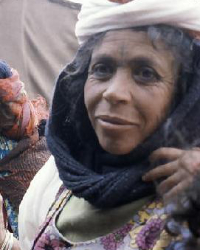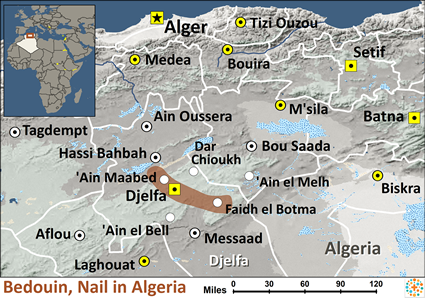The name "Bedouin" is derived from the Arab word bedu. It is a term used to differentiate between those groups who migrate with their herds and those which have settled in an urban or agricultural area. Although distinct, both communities rely on each other economically, socially, and politically.
Many people picture the Bedouin as nomads clothed in long flowing robes, riding across the desert on their camels. However, their identity is more varied. Today, many Bedouin live as semi-nomads, both migrating with their herds and engaging in some form of settled agriculture.
The Arab conquests of the seventh century brought about a rapid expansion of the Bedouin. At that time, thousands of Bedouin left the Middle East and began spreading across North Africa. They have adapted well to the nomadic or semi-nomadic way of life in the desert. Apart from tribal affiliations, there is little to distinguish one group of Bedouin from another. One of these tribes is Nail. In Algeria, each Bedouin tribe speaks Algerian Arabic as their primary language.
Nail Bedouin economy is primarily based on raising livestock. At the core of their society is the need for migration, which is determined by the supply of water and the availability of grazing land. Territories belonging to specific tribes are well defined and their boundaries are known to all. Political borders are of little importance to the Nail Bedouin, although various government restrictions are now having more effect on their migratory lifestyle than in times past.
Because food is scarce in the desert regions, most Bedouin suffer from hunger at some time. Dairy products are their main food source. Milk from camels and goats is made into yogurt and a type of butter called ghee. The women also bake round loaves of unleavened bread that are made from coarse, stone-ground wheat. Dates and other fruits found in desert oases are also eaten when available. Meat is only served on special occasions such as marriage feasts, ceremonial events, or when guests are present. During such times a young goat, camel or lamb is slaughtered and roasted.
To endure the extreme heat of the desert, the Nail Bedouin wear lightweight, light-colored clothing. It is very loose-fitting, allowing for the circulation of air and freedom of movement, yet providing protection from the sun and windblown sand. Their garments are designed to cover the entire body except for the face, hands and feet. The main garment for men is the cotton thawb, which is a long straight-cut white, brown or gray robe. Over the robe, the men wear long silk or cotton jackets called kibrs. The jackets are open in the front and secured with leather belts.
Most nomadic Nail Bedouin live in low, rectangular tents woven from camel or goat hair. A line of poles supports the center of the tent. The wealthier a Bedouin is, the longer his tent will be. The sides of the tents may be rolled up to let the breezes in— or closed tightly during rain or sandstorms. The tents are divided by decorative partitions called gatas. Half of the tent is for the men. It contains a fireplace and is used for entertaining guests. The other half is for the women, children and stored items. It also has a fireplace that is used for cooking.
Nail Bedouin women do most of the work, while the men socialize and make plans for the group. The women's responsibilities include tending to the children; preparing meals; sewing; collecting and weaving the animal hair; pitching, striking, and loading the tents; gathering fuel for cooking; and nurturing the elderly.
Bedouin children stay with their mothers in the women's section of the tent until they are about seven years old. Older boys often help with the herds and tend to the needs of guests. Marriage ideally occurs within the extended family. Generally, the father's cousins have the first preference.
Nail Bedouin society is organized according to a series of overlapping kin groups. The family is the smallest unit, followed by the clan then the tribe. In the past, it was shameful for a Bedouin to accept a wage-paying job. Today, however, many have been forced by economic circumstances into full- or part-time employment.
While most of the Bedouin are Sunni Muslims (many of the Malikite branch), there is still a basic belief in spirits known as jinnis. The jinnis are, according to Arab legend, spirits capable of assuming human or animal form and exercising supernatural influence over humans.
A few of the tribes have been influenced by the mystic tradition in Islam known as Sufism. A Sufi is someone who believes that he has acquired a special inner knowledge direct from Allah.
All the Bedouin groups are basically untouched with the gospel. Although there are resources available in their languages, the Nail Bedouins have proved to be resistant to Christianity.
Ask God to raise up prayer teams who will faithfully intercede for each Bedouin tribe in Algeria.
Ask the Holy Spirit to send dreams and visions to Bedouin family heads, leading to family discipleship.
Pray for Nail Bedouin fellowships in Algeria that will spread to other parts of North Africa.
Scripture Prayers for the Bedouin, Nail in Algeria.
| Profile Source: Joshua Project |

























